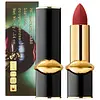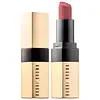What's inside
What's inside
 Key Ingredients
Key Ingredients

 Benefits
Benefits

 Concerns
Concerns

 Ingredients Side-by-side
Ingredients Side-by-side

Isononyl Isononanoate
EmollientAluminum Starch Octenylsuccinate
AbsorbentCI 77891
Cosmetic ColorantMica
Cosmetic ColorantPolybutene
Polyethylene
AbrasiveDicalcium Phosphate
AbrasiveCI 15850
Cosmetic ColorantIron Oxides
Paraffin
PerfumingPolyhydroxystearic Acid
EmulsifyingCI 15985
Cosmetic ColorantCI 42090
Cosmetic ColorantSynthetic Wax
AbrasiveCopernicia Cerifera Wax
Hydrogenated Soybean Oil
EmollientStearic Acid
CleansingMicrocrystalline Wax
Emulsion StabilisingBis-Diglyceryl Polyacyladipate-2
EmollientPentaerythrityl Tetra-Di-T-Butyl Hydroxyhydrocinnamate
AntioxidantSqualane
EmollientCaprylic/Capric Triglyceride
MaskingKaolin
AbrasiveStearalkonium Hectorite
Gel FormingPropylene Carbonate
SolventNylon-12
CI 19140
Cosmetic ColorantIsononyl Isononanoate, Aluminum Starch Octenylsuccinate, CI 77891, Mica, Polybutene, Polyethylene, Dicalcium Phosphate, CI 15850, Iron Oxides, Paraffin, Polyhydroxystearic Acid, CI 15985, CI 42090, Synthetic Wax, Copernicia Cerifera Wax, Hydrogenated Soybean Oil, Stearic Acid, Microcrystalline Wax, Bis-Diglyceryl Polyacyladipate-2, Pentaerythrityl Tetra-Di-T-Butyl Hydroxyhydrocinnamate, Squalane, Caprylic/Capric Triglyceride, Kaolin, Stearalkonium Hectorite, Propylene Carbonate, Nylon-12, CI 19140
Isononyl Isononanoate
EmollientAluminum Starch Octenylsuccinate
AbsorbentPolybutene
Polyethylene
AbrasiveEuphorbia Cerifera Wax
Candelilla Cera
EmollientDicalcium Phosphate
AbrasiveChamomilla Recutita Flower Oil
MaskingPolyhydroxystearic Acid
EmulsifyingPentaerythrityl Tetra-Di-T-Butyl Hydroxyhydrocinnamate
AntioxidantVanillin
MaskingParfum
MaskingMica
Cosmetic ColorantCI 19140
Cosmetic ColorantCI 15850
Cosmetic ColorantCI 17200
Cosmetic ColorantCI 77492
Cosmetic ColorantCI 77891
Cosmetic ColorantCI 77491
Cosmetic ColorantCI 42090
Cosmetic ColorantCI 15985
Cosmetic ColorantCI 73360
Cosmetic ColorantCI 45410
Cosmetic ColorantCI 77499
Cosmetic ColorantCI 77742
Cosmetic ColorantCI 45380
Cosmetic ColorantCI 75470
Cosmetic ColorantCI 45370
Cosmetic ColorantCI 77163
Cosmetic ColorantIsononyl Isononanoate, Aluminum Starch Octenylsuccinate, Polybutene, Polyethylene, Euphorbia Cerifera Wax, Candelilla Cera, Dicalcium Phosphate, Chamomilla Recutita Flower Oil, Polyhydroxystearic Acid, Pentaerythrityl Tetra-Di-T-Butyl Hydroxyhydrocinnamate, Vanillin, Parfum, Mica, CI 19140, CI 15850, CI 17200, CI 77492, CI 77891, CI 77491, CI 42090, CI 15985, CI 73360, CI 45410, CI 77499, CI 77742, CI 45380, CI 75470, CI 45370, CI 77163
Ingredients Explained
These ingredients are found in both products.
Ingredients higher up in an ingredient list are typically present in a larger amount.
Aluminum Starch Octenylsuccinate is a synthetic powder used as an absorbent, thickener, and anti-caking agent.
As an absorbent, it is great at mattifying skin by soaking up the oil. This is why you'll find it in a range of products from makeup to moisturizers.
This ingredient is considered a modified starch. Starch can also be found naturally in plants.
One study from 1991 found that 5% of this ingredient enhanced titanium dioxide SPF by as much as 40%. The study found 1% titanium dioxide had a 5.6 SPF and adding 5% of aluminum starch octenylsuccinate boosted it to an SPF of 8.1
Although “aluminum” in an ingredient name can raise red flags for some consumers, the form and usage context matter significantly. For typical topical applications, there is no substantial evidence of health risks - such as cancer, neurotoxicity, or systemic “aluminum overload.”
Learn more about Aluminum Starch OctenylsuccinateCi 15850 is the pigment color red. It is an azo dye and created synthetically.
Azo dyes need to be thoroughly purified before use. This allows them to be more stable and longer-lasting.
This ingredient is common in foundations, lipsticks, and blushes. This color is described as brown/orangey red.
It has many secondary names such as Red 6 and Red 7. According to a manufacturer, Red 6 usually contains aluminum.
Learn more about CI 15850Ci 15985 is a dye made from petroleum. It is synthetically created and approved by the FDA for use in foods and cosmetics.
The color of this dye is orange/yellow.
This ingredient can be found in makeup, sun care, and skincare.
Learn more about CI 15985CI 19140 is also known as Tartrazine. Tartrazine is a synthetic dye used in cosmetics, foods, and medicine to add a yellow color.
Tartrazine is created from petroleum and is water-soluble.
Some people may experience allergies from this dye, especially asthmatics and those with an aspirin intolerance.
Learn more about CI 19140Ci 42090 is a synthetic dye created from petroleum. It is used to give a bright blue color to cosmetics, medicine, and food.
Ci 77891 is a white pigment from Titanium dioxide. It is naturally found in minerals such as rutile and ilmenite.
It's main function is to add a white color to cosmetics. It can also be mixed with other colors to create different shades.
Ci 77891 is commonly found in sunscreens due to its ability to block UV rays.
Learn more about CI 77891Dicalcium Phosphate is an exfoliant.
Isononyl Isononanoate is a synthetic skin-conditioner and texture enhancer. It is created from nonanoic acid, a fatty acid found in cocoa and lavender oil.
As an emollient, Isononyl Isononanoate helps keep your skin soft and smooth. This is because emollients create a barrier on the skin to trap moisture in.
Isononyl Isononanoate helps give products a velvet feel and improves spreadability.
Learn more about Isononyl IsononanoateMica is a naturally occurring mineral used to add shimmer and color in cosmetics. It can also help improve the texture of a product or give it an opaque, white/silver color.
Serecite is the name for very fine but ragged grains of mica.
This ingredient is often coated with metal oxides like titanium dioxide. Trace amounts of heavy metals may be found in mica, but these metals are not harmful in our personal products.
Mica has been used since prehistoric times throughout the world. Ancient Egyptian, Indian, Greek, Roman, Aztec, and Chinese civilizations have used mica.
Learn more about MicaPentaerythrityl Tetra-Di-T-Butyl Hydroxyhydrocinnamate (long name, huh?) is a synthetic antioxidant.
It is used to help stabilize other antioxidants or prevent the color from changing in a product.
As an antioxidant, it helps fight free-radical molecules. Free-radical molecules are capable of damaging our cells and other genetic material. Thus, antioxidants may reduce the signs of aging.
This ingredient is oil-soluble.
Learn more about Pentaerythrityl Tetra-Di-T-Butyl HydroxyhydrocinnamatePolybutene is used to help control the viscosity of a product. This just means it helps adjusts the texture.
It is a polymer and does not get absorbed into the skin due to its large size.
Studies found this ingredient did not irritate skin in concentrations below 15%.
Learn more about PolybutenePolyethylene is a synthetic ingredient that helps the skin retain moisture. It is a polymer.
It is also typically used within product formulations to help bind solid ingredients together and thicken oil-based ingredients. When added to balms and emulsions, it helps increase the melting point temperature.
Polyhydroxystearic Acid is a soft wax made from castor oil.
It is is a texture thickener, emulsifier, and film-former. Emulsifiers prevent ingredients from separating, such as oils and waters.
Polyhydroxystearic Acid may not be fungal acne safe.
Learn more about Polyhydroxystearic Acid